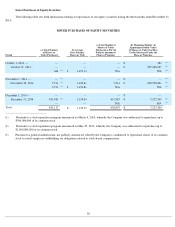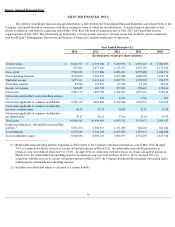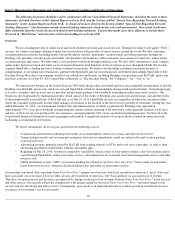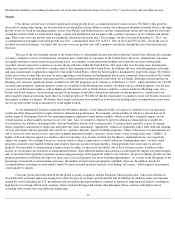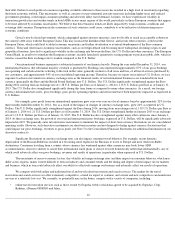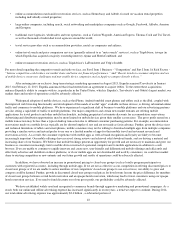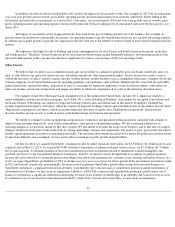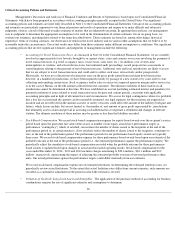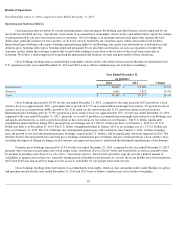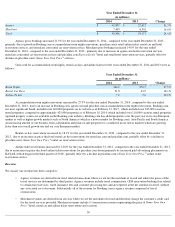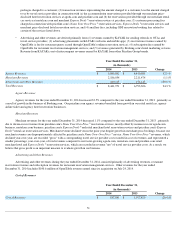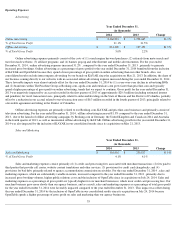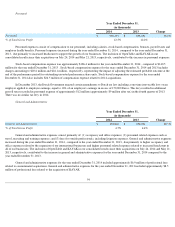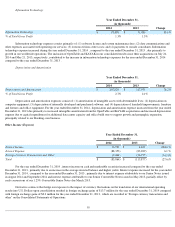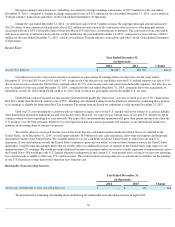Priceline 2014 Annual Report Download - page 50
Download and view the complete annual report
Please find page 50 of the 2014 Priceline annual report below. You can navigate through the pages in the report by either clicking on the pages listed below, or by using the keyword search tool below to find specific information within the annual report.
Critical Accounting Policies and Estimates
Management's Discussion and Analysis of Financial Condition and Results of Operations is based upon our Consolidated Financial
Statements, which have been prepared in accordance with accounting principles generally accepted in the United States. Our significant
accounting policies and estimates are more fully described in Note 2
to the Consolidated Financial Statements. Certain of our accounting policies
and estimates are particularly important to our financial position and results of operations and require us to make difficult and subjective
judgments, often as a result of the need to make estimates of matters that are inherently uncertain. In applying those policies, our management
uses its judgment to determine the appropriate assumptions to be used in the determination of certain estimates. On an on-going basis, we
evaluate our estimates, including those related to the items described below. Those estimates are based on, among other things, historical
experience, terms of existing contracts, our observance of trends in the travel industry and on various other assumptions that we believe to be
reasonable under the circumstances. Our actual results may differ from these estimates under different assumptions or conditions. Our significant
accounting policies that involve significant estimates and judgments of management include the following:
We record stock-based compensation expense net of estimated forfeitures. In determining the estimated forfeiture rates, we
periodically review actual forfeitures. To the extent that actual forfeiture rates differ from current estimates, such amounts are
recorded as a cumulative adjustment in the period in which the estimate is revised.
46
•
Accounting for Travel Transaction Taxes.
As discussed in Note 16 to the Consolidated Financial Statements, we are currently
involved in approximately forty lawsuits brought by or against states, cities and counties over issues involving the payment of
travel transaction taxes (e.g. hotel occupancy taxes, excise taxes, sales taxes, etc.). In addition, over seventy-nine
municipalities or counties, and at least eleven states, have initiated audit proceedings, issued proposed tax assessments or
started inquiries relating to the payment of travel transaction taxes. Additional state and local jurisdictions are likely to assert
that we are subject to travel transaction taxes and could seek to collect such taxes, retroactively and/or prospectively.
Historically, we have not collected travel transaction taxes on the gross profit earned from merchant hotel transactions;
however, in a handful of jurisdictions, we have been required recently by passage of a new statute or by court order to start
collecting and remitting certain taxes (local occupancy and/or sales or excise tax) imposed upon our margin and/or service fee,
or in the case of Hawaii, on the full amount collected from the consumer. The ultimate resolution of these matters in all
jurisdictions cannot be determined at this time. We have established an accrual (including estimated interest and penalties) for
potential resolution of issues related to travel transaction taxes for prior and current periods, consistent with applicable
accounting principles and in light of all current facts and circumstances. We accrue for legal contingencies where it is probable
that a loss has occurred and the amount can be reasonably estimated; our legal expenses for these matters are expensed as
incurred and are not reflected in the amount accrued. A variety of factors could affect the amount of the liability (both past and
future), which factors include, but are not limited to, the number of, and amount of gross profit represented by, jurisdictions
that ultimately assert a claim and prevail in assessing such additional tax or negotiate a settlement and changes in relevant
statutes. The ultimate resolution of these matters may be greater or less than the liabilities recorded.
• Stock-Based Compensation. We record stock-based compensation expense for equity-based awards over the recipient's service
period based upon the grant date fair value of the award. A number of our equity awards have performance targets (a
performance "contingency") which, if satisfied, can increase the number of shares issued to the recipients at the end of the
performance period or, in certain instances, if not satisfied, reduce the number of shares issued to the recipients, sometimes to
zero, at the end of the performance period. The performance periods for our performance based equity awards are typically
three years. We record stock-based compensation expense for these performance-based awards based upon our estimate of the
probable outcome at the end of the performance period (i.e., the estimated performance against the performance targets). We
periodically adjust the cumulative stock-based compensation recorded when the probable outcome for these performance-
based awards is updated based upon changes in actual and forecasted operating results. Stock-based compensation for the
years ended
December 31, 2014 , 2013 and 2012 includes charges amounting to $20.6 million , $24.1 million and $0.9
million , respectively, representing the impact of adjusting the estimated probable outcome of unvested performance share
units. Our actual performance against the performance targets could differ materially from our estimates.
• Valuation of Goodwill, Long-Lived Assets and Intangibles . The application of the purchase method of accounting for business
combinations requires the use of significant estimates and assumptions to determine




